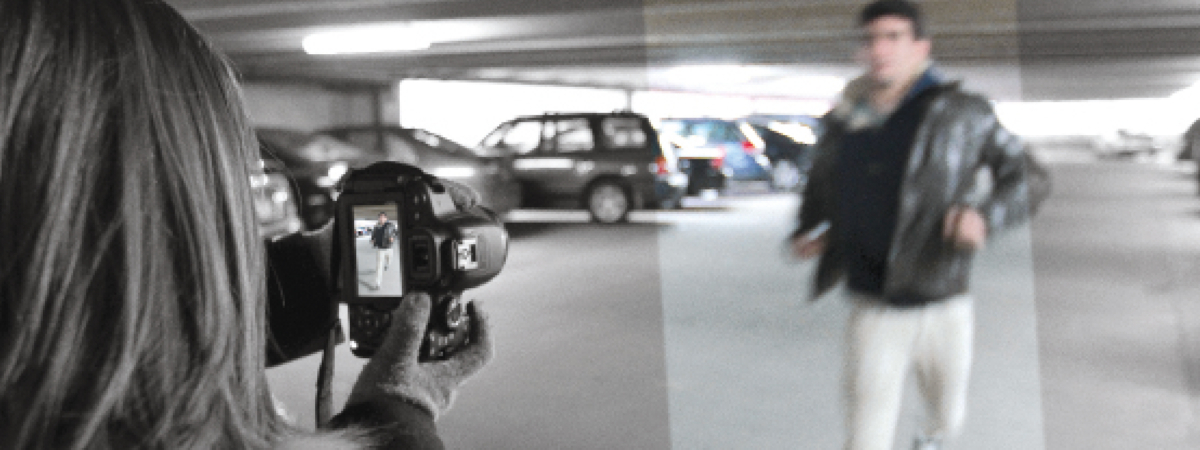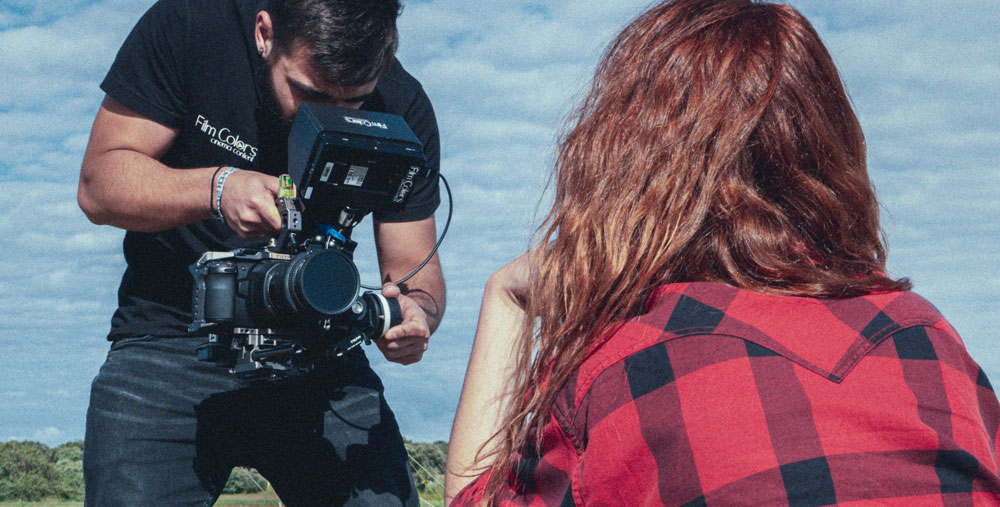Certificate Program
Filmmaking
Develop foundational skills in creating a feature film or working on a professional film set are career outcomes for aspiring film producers
This Certificate introduces students to various aspects of filmmaking with particular attention given to the different professional roles available as career pathways and the different levels of responsibility tied to each. An excellent certificate for studio artists in other media or a skill set that complements the credentials and experience of practitioners currently in the field, this program offers the foundational skills, concepts, and practices needed for videographers to work successfully in interdisciplinary settings and teams. Students learn best practices for digital capture and editing with Adobe Premiere software.
Work can also include internships with regional film production studios, community-based outreach projects and field trips to observe shoots in progress. Students will come away with experience that may help them gain entrance into the industry.

Required Courses
16.5 Credits | Not Available Online
PHV 200 Introduction to Lens-Based Motion Production
Using digital video and still cameras, students will enter the world of Cinema. Students will learn the basic theory and techniques of working with video in addition to being introduced to the visual language that is film through an understanding of the frame image. Topics include introductory-level video techniques to control exposure, focus, F-stop, Camera Speed, basic camera movement, and white balance; intro-level editing using Adobe Premiere and an exploration of concepts of editing such as different types of cutting and transitioning. Students will also learn the basics of sound, including recording sound. Students will have an introduction to screenwriting and storyboarding with an emphasis on the basic formulas of storytelling through film.
Credits : 3
PHV 215 Lighting for Lens-Based Media
Using digital video and still cameras, Lighting for Lens-Based Media will teach students to solve lighting problems through a series of simulated job assignments for still and motion capture solutions. Topics covered include the use of portable lighting for location and studio lighting. Motion capture techniques include lighting to anticipate movement, lighting cues with practical lights, using outdoor lighting, and changing lighting within the same scene. The course emphasizes the process of collaboration from conceptualization through execution.
Credits : 3
PHV 300 Advanced Lens-Based Motion Production
This class continues in the pathway of the Introduction to Lens-Based Motion Production course. Students will learn more advanced techniques, complimenting the foundations taught in the introductory course. We will look at working with color and topics surrounding color grading and color theory. Students will learn more advanced forms of audio capture as it relates to film, including an introduction to audio design. We will look into advanced camera functions and advanced camera movements. Advanced storytelling techniques will include character arcs and character design. We will discuss and learn advanced editing through the study of professional editors.
Credits : 3
PHV 403 Lens-Based Motion Projects
Students will work on semester-long projects that include short films and documentary work. Projects will be generated through combined collaborations amongst students, while working through each stage of production, from development, pre-production, production, photography, wrap, post-production, and distribution. Students will have the ability to try out various roles such as directing, acting, camera, grip, lighting, and design or a self-composed role based on student strengths and interests. Students will gain hands-on experience to prepare them for the film community. The work in the course follows closely with Senior Thesis projects in PHV 402 Senior Thesis II.
Credits : 3
Choose one of these two classes
GE 280 Introduction to Filmmaking
Creating a feature film or working on a professional film set are career outcomes for aspiring film producers. Achieving these opportunities requires preparation, ideation, and field experience. This course introduces students to various aspects of filmmaking with particular attention given to the different professional roles available as career pathways and the different levels and degrees of responsibility tied to each. Students will learn what a pitch deck is, and then create one throughout the semester. They will also create a promotional video for their project. Overall skills of pitching, through the creation of a detailed production deck to successful networking, marketing, and finance will be covered. No prior knowledge of filmmaking is necessary for this course.
Credits : 1.5
OR
GE 288 Filmmaking Field Work
This course compliments the film industry knowledge gained in GE 280 Introduction to Filmmaking. The two courses, however, are not sequential. Students will work in the field on various projects. These can be a group-conceived short film where students work collaboratively, mimicking a real film set. Fieldwork can also include internships with regional film production studios, community-based outreach projects, and field trips to observe shoots in progress. Students will come away with experience that may help them gain entrance into the industry.
Credits : 1.5
Choose one of these two classes
AH 220 Introduction to Film Studies
This course introduces students to the fundamentals of film study with the analysis of film narrative and cinematic techniques, a survey of film genres, and a basic overview of aesthetically and/or historically significant films. Students will be asked to demonstrate critical thinking, analysis, research, and communication skills within the context of this course.
Credits : 3
OR
AH 320 Cinema as Art
This course is an in-depth investigation of contemporary films with an emphasis on foreign, independent, and art-house cinema as well as the auteur filmmaker. It examines the roots of today’s contemporary cinema, analyzes film narrative, explores different schools of avant-garde filmmaking, and examines the impact of new technologies with a focus on the elements that make film an art form. Students will be asked to demonstrate critical thinking, analysis, research, and communication skills within the context of this course
Credits : 3

Who Should Enroll
The program is designed for a wide range of individuals. College experience is not a prerequisite for this program. High school and college graduates, veterans, professionals, and entrepreneurs will be among the students who bring their diverse perspectives to the program.
Cost
$1,157 per credit hour
A total of 16.5 credit hours are required. Credits will be billed per course.
How to Register
Enrolling in one of PCA&D’s Certificate Programs is simple. Confirm your intent to pursue one of our certificates by filling out an application.
If you have any questions regarding mapping out a plan, upcoming class schedules, or completing your certificate, please contact an Admissions Counselor at 717.396.7833 ext 1001 or email admission@pcad.edu.
